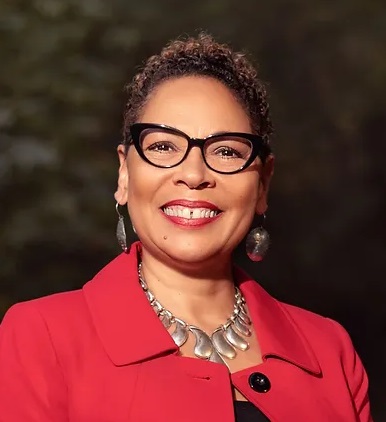Podcast: Play in new window | Download
Subscribe: Spotify | Email | RSS
On this week’s episode of The Leadership Habit Podcast, Jenn DeWall sits down with Dr. Caprice Hollins to learn how to have difficult conversations about race. Leaders at all levels are learning to lean into this topic because it impacts our lives, our workplaces, and the world around us. How can we, as leaders, learn to move through discomfort and have challenging conversations that lead to a more equitable world?
Meet Dr. Caprice Hollins, Co-founder of Cultures Connecting
Caprice D. Hollins was born and raised in Seattle, WA. She received a doctorate in Clinical Psychology with an emphasis in Multicultural and Community Psychology from the California School of Professional Psychology. Dr. Hollins has over 25 years of experience facilitating race-related workshops. She co-founded Cultures Connecting in 2008, and her second book, Inside Out: The Equity Leader’s Guide to Undoing Institutional Racism, was recently published. She’s a Seattle 2020 TEDx Speaker on What White People Can Do to Move Race Conversations Forward.
When asked to introduce herself to The Leadership Habit Audience, Caprice said, “I am a licensed clinical psychologist. That’s what my doctorate is in. And I minored in what is now referred to as DEIB. It was multicultural and community psychology. I taught graduate school on issues around multicultural perspectives, focusing specifically on race. I just released a book, Inside Out: The Equity Leaders Guide to Undoing Racism, which I’m really proud of. Did a TEDx talk.
Then my company is called Cultures Connecting. What we do is we help organizations have what you said, these very uncomfortable, difficult conversations about race, and provide them with strategies and tools and ways of thinking so that people can work together collectively in their organizations to not only dismantle racism but sexism, ableism, homophobia, Islam, Islamophobia, all of these isms, this othering that we do as we continue to marginalize people because of an identity that they hold.”
What Inspired You to Pursue DEIB in Your Career?
Jenn asked Caprice what inspired her to pursue her work on multicultural and community psychology, or DEI. And Caprice explained, “Thank you for asking that, Jenn. So, I’m biracial. My mom’s white. My older brothers and sisters are white– from her first marriage– with blonde hair and blue eyes. My mother divorced and got pregnant with me a number of years later. And you know, this is a time in our country when interracial marriages, let alone relationships, were illegal in some states. And so I grew up in this very diverse family. My brother is gay, and I always knew. He was Ms. Gay Seattle one year. Love bragging about that. My dad married a woman from Thailand.
When I went to grad school, all of our courses looked at the topic through an equity lens. This was long before we used language like equity or talked about things like privilege or bias. And I was blown away, Jenn.
I was on an emotional re roller coaster around as I looked at how I had been socialized and things that I had said and done that colluded with racism essentially. And it became a very liberating experience for me to acknowledge, yeah, I do stereotype. And yes, I do have identities where I hold privilege, and I wanted other people to be able to have that same experience of deconstructing how they’ve been socialized so that they could reconstruct a new way of being in the world.
It’s very freeing, too, instead of working really hard to say, I don’t notice, or I don’t want you to reveal a stereotype. Instead, be prepared that someone might say to you, Hey, I think you were biased in that moment. And say, tell me more about it because you know, it’s a possibility. Or to have someone check your privilege and be like, wow. Yep, there it is. You know, it just shows up in all different kinds of ways in my life. And it feels so much better not to run from it but to lean in it, look at where it’s coming from, and then see, Hey, what can I do differently? How can I show up differently?”
Why is it Important to Have These Difficult Conversations at Work?
Later in the conversation, Jenn asks Caprice to explain why it is so important for leaders to be able to talk about race or have productive conversations about diversity.
Caprice shared, “That awareness of ourselves and how we’ve been racialized or socialized and that knowledge of other people’s experiences who are different from ours. Learning about those things and continually growing in those areas will help us to get better at having hard conversations.
When we can get to the hard conversations, then collectively, we can look at things and ask different questions about things that we see happening in our organization. We can work together to think about what we can do to create change.
The conversation will help us get to the action, to the undoing or the addressing of the institutional “isms” in our organization. We can’t look at our hiring practices and how bias is embedded in those practices. Then how will we ever work collectively together to change our hiring process? So the conversation can inevitably lead to people working together to create that change.”
Why is This Kind of Conversation so Difficult?
Jenn agrees that these conversations are so important, saying, “Yes. Right. So if you’re a leader and you’re hearing this– hiring, how we collaborate and work together, how we move change forward, how we adjust processes, how we create equity, there are so many reasons why this conversation is still important to have, even if you feel like you took that one class.
This is an ongoing conversation, but let’s get to the barrier. We’re talking about how to have these difficult conversations at work about race. Why is it hard? Why do you think, like from what you see, why is it hard for people to do it?”
Caprice agrees and shares her perspective, “I think for people of color, it’s hard to engage white people because, in the process, white people will often become defensive. I’m not like that. I’m different from other white people. They will take that kind of calling in that kind of like trying to share with the white person you said or did something that was harmful.
They’ll take that and they’ll personalize it as if it means they’re a bad person. Rather than receive it as a gift. Here’s an opportunity for me to think more deeply about how I’ve been socialized. So people of color often don’t wanna take the risk because then, if you’re my boss or you’re my coworker, it might affect the relationship. If you’re my coworker, it might affect how you treat me. If you’re my boss, I might experience micro-invalidations in the process.
For example, you’re being too sensitive. That’s not what I meant. Maybe they didn’t mean it that way. So, for self-preservation, I go to work and just kind of do what I need to do. I have all of these experiences. I go home, and I talk about the experiences that I had rather than that burden of trying to push, you know, and create change for white people.
I think the conversation is hard because, again, I think they see it as a good and bad narrative versus you’ve been socialized. I do believe there are some people that no matter what you say, no matter what you do, no matter what research you present to them, there is nothing that is going to make them curious. Even just a little bit about how someone’s experiences might be different from their own, they are too heavily invested in continuing to see things the way that they see them.
Ultimately, I think to myself, what do white people have to give up in order to entertain that the reality for people of color is very different than the reality for them? And what they have to give up is their way of thinking, what they’ve spent a lifetime believing, the way they engage the work that they have to now do that’s different from what they’re comfortable with doing for many white people is too risky and, and they don’t wanna give up that comfort, right? It’s a lot of work. It’s hard work to look at how you’re socialized, and then you have to change how you behave, how you lead, and how you think. And so that investment, getting people to do that, is probably one of the bigger challenges.”
Getting it Right Requires Vulnerability
As leaders, having conversations about race can be scary. People feel afraid of being misunderstood or afraid they will be perceived as a bad person. Jenn explains her fear of making mistakes, saying, “I’m not sure if our audience can even tell, by the sensitive nature of this podcast, I feel like I’m a pretty unreserved person, but I am more tentative in how I am talking because I want to make sure I am being respectful and curious. And so I want to share that because I think part of me is like, I still have the fear of getting it wrong, and I know that there’s still work to do, and I’m not even aware of some of the ways that I might get it wrong. But could we talk a little bit more about the fear of making mistakes and the fear of getting it wrong?”
Caprice replies, “First of all, thank you for that vulnerability, Jenn, right? Like, that’s the work, right? And so, yeah, I notice what I’m feeling in my body right now. I’m walking on eggshells or whatever it is, being very thoughtful or careful about my words for fear that I’m going to make a mistake.
And even as I teach people, for example, ask questions with genuine curiosity, Hey, just do it. I get it wrong. A lot of times. I just have this as a strategy so that I can either circle back around, try it again, or think, okay, the next time I have that opportunity, what are some of the questions that I could have asked? But I do think that naming your fears is an important part of this work because oftentimes if we don’t identify it, if we don’t surface it, our fears will keep us from engaging. And then no learning happens, right?
We’re actually controlled by our fears. And so I’m afraid too, I’m afraid of losing credibility. I’m afraid of, you know, making mistakes, getting it wrong. All of the things that you said, I tend to sweat, right? I would say it’s an I work hard for my money kind of moment because somebody has said something, and I’m having a reaction, and now I need to facilitate it or lean into it.
It’s not an easy thing to do. And this is why we tell people that your hope for what you want to have happen, the changes you want to see in yourself, your community, and your families, has to be greater than what your fears are. Otherwise, you won’t do it, right? You won’t, you won’t lean in. And so, you know, that’s very real.”
Where to Find More from Dr. Caprice Hollins
Be sure to listen to the full episode on your favorite podcast streaming service to get her advice and strategies for navigating these difficult conversations at work! You can also connect with her to learn more in several ways:
- Connect on LinkedIn
- Visit CulturesConnecting.com
- Watch her TEDx Talk
- Buy her book, Inside Out: The Equity Leader’s Guide to Undoing Institutional Racism





